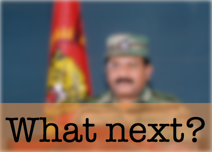We have been conditioned by war for three decades, to accept violence as a means of resolving conflict. As heinous as the events that took place in July 1983 are, they do reflect at some level, that our society then was not ready to accept the deaths of 13 of “our own”. Thirty years on, we have been conditioned by a daily death toll, to accept even hundreds if not thousands of lives as a fair price to pay for the mere hope of a superficial peace. Our narrow and racist definition of ‘our own’ then, has led to catastrophic consequences. The resulting erosion of our moral conscience as a society undermines our ability today to engage in the post war reconstruction of our social fabric with the essential threads of justice and equality. Three decades (or more) of terrorism and state violence together with our limited understanding of history and lack of a vision for the future, has made us fearful and insecure as a nation and it sometimes seems difficult to be optimistic of our ability to face the challenges of reconciliation with equanimity.
On the other hand, surviving a debilitating war for thirty years and incompetent and corrupt governments for twice as long has – if nothing else – proved that we are a resilient and resourceful people. There’s nothing much that can break us and there is nothing that can stand in the way of us being able to mend ourselves. We are the state. We are the government. We have not only had plenty of time to recognise that we are responsible not only of electing competent and able politicians to govern, but more importantly that our job does not end at the ballot box – it starts there. We are responsible for our fate and the fate of our nation for the sake of generations to come, and there is no excuse to forgo that responsibility. We have to find ways of holding the politicians accountable for their actions. We have to check our own moral conscience, and realise that bribing a government official is the cause of government corruption and not vice-versa.
We need to become a citizenry that is empowered with knowledge, reason and confidence to think freely and independently and to articulate, debate and discuss such thoughts with civility and mutual respect. We need to be creative; to forge new solutions to the old and persistent problems and the courage to question (but not necessarily doubt or criticize) our own intuitions and dogmas. But the critical question is; “how do we become that?”
Perhaps we should start by removing all forms of political interference and influence from education policy and media. Our education system needs to be reformed and made independent and more dynamic. It has become a power-base of mediocrity as a result of being allowed to be manipulated by politicians and being left to languish in a cancerous invasion of politically and morally bankrupt ideologies. No individual or organised group should be allowed dictate what we learn and the topics we research, or control the inflection of the content that is carried by the media that is funded by the public. A citizenry needs the media to educate them about the factual: news and current affairs, latest in science and technology, ideas and philosophy. But we need to understand that those of us who depend on the media to deliver pre-fabricated opinions is a danger to ourselves as well as our society.
We should realise the shallow grandiosity of our understanding of history, the depravations of our limited exposure to the world beyond our shores, the poverty of our inability to appreciate and enjoy other cultures in between the extremes of wholly rejecting them or adopting them in place of our own. There is much wealth in learning other languages because they can broaden our minds to new ways of thinking, provoking ideas and open us to the world and the world to us, and be able to appreciate in the same vein that our own languages are among the oldest and richest in the world and that they alone can express our innermost thoughts and feelings and they alone can describe who we are.
We need to encourage critical thinking and logical reasoning – especially when they threaten to separate us from our dogmatic clinging to superstition and speciousness. We should mature as a nation to appreciate and debate opposite viewpoints with civility and respect for one another. I belong to the younger generation which is perhaps are more acutely and desperately in need of hope and opportunity. We need a wider worldview. I do not know whether we are yet ready to admit that nothing or no one will ever hand over these opportunities and knowledge to us in a silver platter. Post war Sri Lanka however, presents us with the best opportunity that perhaps we will ever have as a nation to create for ourselves a broader and more inclusive identity and a sense of pride in ourselves that is also respectful of others. Today – not in three weeks (or however long it takes for the war to end) – we are presented with an opportunity to test our abilities, talents and inscribe a meaningful and more accurate vision of our real greatness in the pages of history.

This submission is in response to a question posed by Groundviews posed here that asked readers to opine on a war ‘over in 3 weeks’ and a ‘post-LTTE’ Sri Lanka. Please visit this original post to read a rich spectrum of opinion and commentary on the nature of post-war Sri Lanka.
